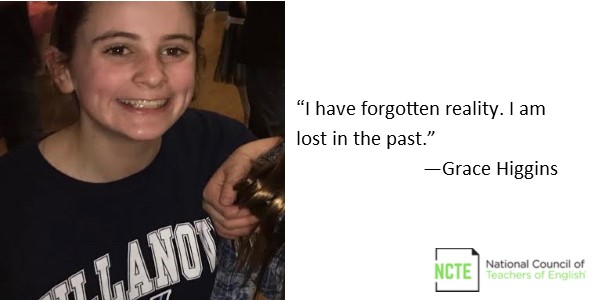This blog is written by seventh grader Grace Higgins, a student of NCTE member Joe Pizzo.
Joe Pizzo’s introduction:
When asked what techniques I use or lessons I teach to inspire depth in my students’ writing, such as Grace demonstrates in the following poem and explanation, I simply return to the main message of Laurence Perrine’s Sound and Sense: we do indeed write for sound, as well as for sense. I begin each of my integrated language arts classes with a “Do now” activity through which we learn a daily word and its definition. Next, my students write sentences of ten or more words and use the new word in those sentences. I must note that Grace has the unique ability to infuse poetry throughout her prose, no matter what the task happens to be. After reading a number of her original sentences that contained various poetic devices implemented with precision, I encouraged her to expand one of her sentences into a poem. She did so after some additional encouragement, and the result is typically impressive. As a writing teacher, my mission is both to inspire and to encourage my young writers. In the words of Virginia Woolf, “Yet, it is true, poetry is delicious; the best prose is that which is most full of poetry.”
Lost in the Past
The wind whispers, to the tune of an eternal brook, in my ear, the stories
that have slipped abruptly through my grasp.
My mind wanders,
then returns,
for I have remembered my adoration for the life in the reality,
set in my haven that provides my remembrance,
from the serene environment that wraps me tight,
like a snake vigorously squeezing its prey.
The sun shimmers, softly on the left side of my brain,
causing me to, like water to fire,
engulf its memories of days far from the moment.
Again, my mind lingers in memories
but as quickly as a forceful breath is drawn from my mouth,
I realize, like a mother recalling her flock, my dream
and return to the actuality of existence I call my haven of sanity.
Lightning crashes onto a tree,
in the forest beside my right hand,
and my mind flashes, like the flicker of a lightbulb,
to the purlieus of my youth
I have forgotten reality.
I am lost in the past.
—Grace Higgins
The present is a gift. However, many people do not experience this gift. The poem “Lost
in the Past” represents the feeling of not being able to live for today because the past holds one back. Without peace with the past, one cannot move forward in life. “My mind wanders, then returns, for I have remembered my adoration for the life in the reality” means that the person loves their life in the present but the past keeps haunting the person, therefore preventing progress in the present.
The inspiration for this poem came from both meeting people who struggle with
their past and seeing the pain and suffering they face every day. This inspiration then led to the idea to writing a poem about the daily struggles that hundreds of people face. The poem hopes to shed light on both these struggles and the burdens of the past.
After finishing the poem, my writing style has changed from a more immature, bouncy
style to a sophisticated, in-depth style. For instance, I used to write, “The room was colorful.” However, now I write sentences like, “The room flourished with colors of green and painting of days long past adorned the turquoise walls.¨ This experience has widened my expanse of writing styles, thus allowing me to play with unique writing styles and technique.
Grace Higgins is a 7th grade student from Chester, New Jersey who has achieved high honor roll every semester while at Black River Middle School. In addition to being a dedicated student who loves to read and write, Grace participates in soccer, basketball, ski club, track, chorus, Girl Scouts, and the alter server ministry at Saint Lawrence Church. Grace is known by her friends and family to be kind-hearted, helpful, and someone who lets her light shine in a way befitting of her name.

